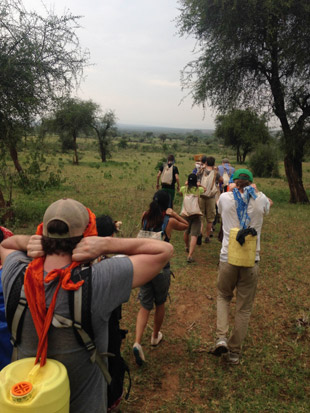Carleton students team up to develop water harvesting solutions in Tanzania

Undergraduate students from Carleton’s Sprott School of Business, School of Industrial Design, and Department of Civil and Environmental Engineering worked together this past term on an exciting course project to develop sustainable water harvesting technologies in Tanzania.
Avery Price, a fourth year Bachelor of Commerce student with a concentration in Marketing, saw the course BUSI 3117: Developing Creative Thinking promoted in Sprott’s student e-newsletter and applied for the opportunity to travel abroad with a group of students working for a purpose.
“I was really drawn to it being interdisciplinary,” said Avery. “I’ve loved getting to know the industrial designers and engineers.”

The students were tasked to develop water harvesting solutions using locally-available materials that also would create a source of income and support the local economy. While engineering and industrial design students focused on the technology, business students focused their efforts on developing a business model and calculating the social return on investment.
In January, the students travelled to Tanzania where they spent 10 days meeting with residents of several villages in the Longido District, testing and proposing solutions. They worked in collaboration with Project Tembo, a non-profit organization that provides educational, micro-finance and micro-business opportunities in Tanzania.
For the Maasai people living in the Longido District, access to water is a critical issue due to an extreme climate and limited means to collect and store water. Located in northern Tanzania to the west of Mt. Kilimanjaro, the region experiences long periods of severe drought with alternating seasons of heavy rain and flooding.

The villages do not have mechanisms in place to capture and store the excess rainwater from the wet season for use in the dry season, resulting in chronic water shortages, an unstable food supply, and a number of health risks. The village women and children, who are responsible for collecting water for the village, often walk over a kilometer to access water from stagnant pools.
“There is no infrastructure,” says Sprott Professor Troy Anderson. “The local hospital has to send donkeys every day to get water for the clinic.”
The challenge was to find solutions that the local people could adopt and sustain on their own. One village the group visited had been gifted a well. Eighteen months after it was installed, the pump broke and there were no means to fix it.
When testing their prototypes in the real environment, many of the students found their initial designs were not suitable for Longido’s climate and economy.

Cultural perspectives also presented challenges in finding viable solutions.
“In North America, we have this idea of investing for the future so that if you have a lot of something now, save some of it for later so that you will always have moderate amounts of something,” said Avery. “We would say, ‘why don’t you save some so that you have water later’ and they would say, ‘no, when it’s wet we have water and we want to use it.’ And in the dry season, they would have nothing. The idea of saving wasn’t culturally relevant.”
During their time in Tanzania, a lot of the projects changed significantly. The students spent the rest of the Winter term developing their designs, prototypes and business models.
“In Business, it’s easy to get frustrated if your plan doesn’t work out the way you thought it would,” said Avery. “But the industrial designers, they are used to their projects changing at the drop of a hat. They are so adaptable. …With the engineers, I definitely appreciated their attention to detail.”

In June, the student teams of a few selected projects will return to Tanzania to build and implement the water harvesting solutions. A crowd-funding campaign has launched to help offset travel costs, purchase local materials, as well as cover costs for translators and meetings with villagers. To support these students and help make a difference in Tanzania, visit futurefunder.carleton.ca.
“I think I will eventually end up working in an NGO. So, the big takeaway for me is realizing how difficult it would be to work in a developing country,” said Avery. “You have to be an adaptable person and work within limitations. I know if I want to work in that world, then I need to start training myself to think more flexibly. “